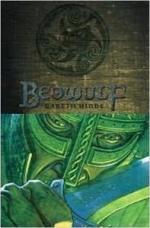|
|
Beowulf Topic Tracking: Treasure
Treasure 1: In 8th century feudal society, the possession of treasure, gold, famous swords, and mail/helmets regulated loyalty, allegiance and protection. Warriors who fought for a particular Lord, such as Shild, could be guaranteed a certain amount of treasure and spoils from war, raids, and different battles, in return for their service. The Lord with the most treasure, bravery and fame would become King; the throne was then passed down to youngre generations of great warriors. Thus, Beo, Shild's son, inherited the throne along with his father's wealth. The entire system was based on a Germanic heroic code of honor, which designated bravery, strength, wealth, and honor as desired values. A King was a "ring-giver," because gold often came in rings, also a symbol of loyalty or sacred vows.
Just so, Hrothgar's lieutenant, upon seeing Beowulf, can tell he is wise and honorable, from his weapons:
"Nor have I ever seen,/ Out of all the men on earth, one greater/ Than has come with you; no commoner carries/ Such weapons, unless his appearance, and his beauty,/ Are both lies." pg. 31, lines 248-250
Treasure 2: The mark of success in battle, strength and prowess, is shining, beautiful armor, silver mail and gold swords. The more brilliant their weapons were thought to be, passed down from their forefathers and past battles, the more honorable and noble the warriors were.
"They arrived with their mail shirts/ Glittering, silver-shining links/ Clanking an iron song as they came./ Sea-weary still, they set their broad,/ Battle-hardened shields in rows/ Along the wall , then stretched themselves/ On Herot's benches. Their armor rang;/ Their ash-wood spears stood in a line,/ Gray-tipped and straight: the Geats' war-gear/ Were honored weapons." pg. 33, lines 321-330
Treasure 3: Weapons and swords are the emblem of feudal society, justice and organization by men. Neither Grendel nor Beowulf need swords to battle each other.
Treasure 4: Gold is used as a peace offering by King Hrothgar after Beowulf's father, Edgetho, killed a Wulfing warrior. Hrothgar makes peace with the Wulfings, and therefore the Geatish line is indebted to the Danish court. This explains why Beowulf immediately travels to Denmark to rid Herot of Grendel.
"I bought the end of Edgetho's/ Quarrel, sent ancient treasures through the ocean's/ Furrows to the Wulfings; your father swore/ He'd keep that peace." pg. 38, lines 470-473
Treasure 5: It is significant that Hrothgar's queen, Welthow, pours mead for each warrior out of a jeweled cup belonging to Hrothgar's kingdom. Gold and treasure such as this are the property of Hrothgar, and the act of pouring wine from such a cup signifies the Danish warriors' and now the Geatish warriors' allegiance to Hrothgar in battle. Welthow is described as a "bracelet-wearing queen" (ll. 622), which also relates directly to her role as a peacemaker; much like treasure, women were often married off between feuding tribes to make peace. Beowulf invokes his promise to Hrothgar after her words, sealing their transaction:
"When we crossed the sea, my comrades/ And I, I already knew that all/ My purpose was this: to win the good will/ Of your people or die in battle, pressed/ In Grendel's fierce grip. Let me live in greatness/ And courage, or here in this hall welcome/ My death!" pg. 43, lines 632-638
Treasure 6: Gold was paid to the warrior for killings supported by a King or a state.
Treasure 7: Beowulf used his bare hands to kill Grendel, but fights Grendel's mother wearing his mail and armor, Hrothgar's helmet, and carrying Unferth's sword, Hrunting.
Treasure 8: Treasure owned by generations of warriors in a particular tribe can often breed conflict. Beowulf's example when speaking of the Danes and Hathobards, is that some young warrior will see a Dane using a sword or helmet that once belonged to his father or Lord, and want to start a war because of it.




